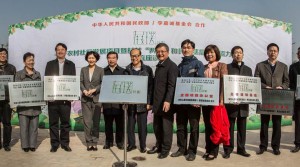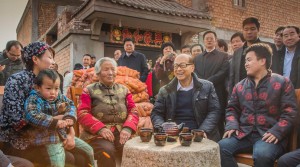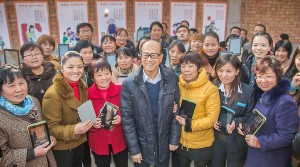(Shaanxi Province, 19 November 2013) Statistics made it easy to figure out and demonstrate the importance of women in China to the world. In 2013, the population of women in China has reached 650 million, accounting for nearly 10 per cent of the world’s total population (7.2 billion). About 330 million (more than 50 per cent) still reside in rural areas. Not only are they primary care-givers to their families and their young, they contribute more than 65 per cent of China’s rural manpower. By most measurable indicators, these women represent a formidable force to advance and sustain rural economic development. Efforts to unleash this untapped well of potential will have a profound impact to the development of China and the rest of the world.
Inhibited by cultural and socio-economic constraints, only approximately 20 per cent of women are in village administration position, Social inequality limited the learning opportunities for women and therefore their academic qualifications are generally inferior to men. The majority of Chinese village women possess only a primary school education and a mere 40 per cent have received high school education. Around 22 per cent of Chinese village women (748,000 strong) sit on Villagers Committees and Village Party Branches representing about 588,000 villages in China. While the numbers may not appear significant, these women demonstrated their dedication and perseverance to serve their community. Some are re-elected by their villagers, and one even acted as the spokesperson of her village, attending the 18th National Congress of the Communist Party of China.
The aim of Li Ka Shing Foundation (LKSF)’s “Project Define” is to enable Chinese women villagers to realize their power to serve the community through the use of technology in boosting up their knowledge base, then creating a rippling effect to gain more support from the government and other social resources.
Successful Pilot Program Propels Project Define into Next Phase
LKSF and the All-China Women’s Federation jointly launched a Pilot Training Program under Project Define (Qi Pu) in 2010. The Foundation donated RMB22.5 million to provide higher education training for over 4,300 women village officers in the Anhui Province, the Guangxi Zhuang Autonomous Region, the Chaoshan region of Guangdong Province, and northern Guangdong. The project was supported by Anhui University, Guangxi University, Guangxi Agricultural Vocational College and Shantou University. Using seed grants, the project also financed approximately 350 rural development programs conceived and implemented by the women village officers themselves. The entire project benefited 650,000 people living in rural areas, doubling the income of the villagers, enhanced cultural development and strengthened the social harmony of the communities.
The pilot projects inspired the confidence and broadened the horizons of many women village officers. Zhang Shun-ying is an elected women village officer in Shangxi Village, Shantou in Guangdong and her work was originally centered on farming. With the learning experience in Shantou University, gaining the seed grant and interacting with her peers from other village, Zhang said “I was able to ponder, share, and learn new knowledge as well as take on new theories under an environment where I was treated as an equal and with mutual respect.”
Given the success of the pilot, the Foundation will commit an additional RMB20 million to jointly launch a new phase of Project Define (Zhan Pu) with China’s Ministry of Civil Affairs. The new project will be implemented in the provinces of Hunan, Shaanxi, Xinjiang, Guangdong and Guangxi. The new phase of Project Define (Zhan Pu) will ride on the success of the pilot with the goal of empowering over 4,000 women village officers in community management and advance their leadership roles in their village’s socio-economic development. The project will encourage and support their initiatives to improve people’s livelihood, education, environmental well-being and alleviate poverty.
“No single person has the answers to all of world’s problems, but those who have the resources should empower others with the talent and abilities to share the social responsibilities. Chinese women, especially village women, have a vital role to play in the future. Their potential and willpower should not be undermined. Through self-actualizing of knowledge and management abilities, not only will these women act as a booster to socio-economic development in rural areas, it will be an endowment of our care for the future”, said Mr Li Ka-shing, Chairman of the LKSF.
The Four Main Components of “Project Define (Zhan Pu)”
Knowledge Enhancement & Relationship Building:
- Receive higher education training: Break free of traditional cultural norms and move from village to universities
- Distance learning platform: learning without limits through advanced technologies
- Cases Sharing and Interactive Learning: sharing life experiences and difficulties encountered with other students and encourage mutual support
- Using specialized software developed by university students: recognize the care and compassion of the younger generation for rural development and strengthen people’s connections by the use of technology
Augment Abilities & Encourage Innovation:
- Diversified Learning: Improve mediation skills, knowledge of village economic development, regulations and law, project formulation, and management
- Bottom-Up Approach: encourage civil administration staff on the grassroots level to report problems encountered in order to address the core of the issues.
Seed Grants Promote Mutual Trust:
- Interactive Learning and Building Fortitude: Students lobby and vote for each other’s projects to win seed grant thereby encouraging deliberation and inspiring new ideas
- Effect of Leveraging: fight for additional funding from local government thereby stimulating greater input of social resources and draw greater public attention
Giving Back to the Village:
- Implement projects and improve people’s standard of living
- Increase villagers’ income
- Demonstrate women’s capabilities and unite the villagers
The launching ceremony of “Project Define (Zhan Pu)” is held today in Dashitou Village, located at Weicheng District, Xianyang City in Shaanxi Province. Mr Li Ka-shing and Mr. Dou Yupei, Vice-Minister of the Ministry of Civil Affairs are joined by officials of Shaanxi Province. They exchanged ideas with 30 women village officers, some of whom are from Guandong and Guangxi and are alumnae of the training programs. The women shared their experiences at the universities and virtual learning, as well as how they implemented initiatives to improve the development of their villages. The women village officers who shared their experiences in the ceremony received tablet PCs to continue their on-line learning and be part of an interactive knowledge network.
###
For inquiries, please contact: Li Ka Shing Foundation
Mr Jeremy Lau
Tel: +852-2128 1207
Fax: +852-2128 1766
Email: jeremy.lau@lksf.org
About Project Define
A. Background
The project aims to empower women village officers in China’s rural areas. By infusing these women with knowledge-based capabilities and by consolidating the strength of small communities, the project brings benefits to the entire rural area.
Pilot Projects Implemented in 2010–2012:
The Li Ka Shing Foundation and the All-China Women’s Federation jointly launched a pilot training program under Project Define (Qi Pu) in 2010. The Foundation donated a total of RMB22.5 million to provide higher education training for over 4,300 women village officers in Anhui Province, the Guangxi Zhuang Autonomous Region, the Chaoshan region of Guangdong Province, and northern Guangdong. Using Seed Grants, the project also financed approximately 350 rural development programs conceived and implemented by the women village officers themselves. The entire project benefited 650,000 people living in rural areas.
B. The Project
Given the success of the pilot projects, the Foundation will provide an additional RMB20 million to jointly launch a new phase of Project Define (Zhan Pu) with China’s Ministry of Civil Affairs. The new project aims to empower the popularly elected women village officers, who, on the frontlines, have a thorough understanding of fundamental needs, and grassroots-level civil administration staff. The project will also cover a larger geographic area to benefit more villages.
Areas Covered:
The new project will be implemented in Hunan, Shaanxi, Xinjiang, Guangdong and Guangxi.
About the training:
- Through a five-day training program in a university and a distance learning platform, the project aims to boost the capabilities of 3,800 elected women village officers and improve the service standards of 500 grassroots-level civil administration staff, as well as promote a culture of mutual learning;
- The project is supported by Shantou University as well as Hunan Normal University, Northwest University, Xinjiang University and Guangxi University, with training courses offered on campus.
Seed Grants:
The Foundation will provide 800 women village officers with RMB5,000 each as a Seed Grant to implement their village seed projects that will improve people’s livelihood, education, environmental well-being and poverty alleviation.
The new phase of Project Define will contribute to innovation and development in village community management by providing effective training to women village officers to perform leadership roles in village administration and socio-economic development. It aims to transform the development of rural areas by boosting the power of women.
The Concept
1. The project name
The Chinese name of the first phase of Project Define “Qi Pu”, literally ‘priming the un-carved jade’. The Chinese name “Zhan Pu” of the new phase of Project Define, which follows from the first phase, means that the abilities of the women village officers and grassroots-level civil administration staff will now be demonstrated; they will apply what they have learned to serve their village communities. The name encapsulates both the meaning of breakthroughs and continuity.
2. Why focus on training women to lead the development of rural areas?
Women account for more than 60 per cent of China’s rural working population; they are fully capable of supporting and sustaining rural economic development. However, due to the traditional cultural norms and varying levels of socio-economic developments, the percentage of women involved in village administration is low, and their leadership capabilities can be further improved. The Foundation hopes that the project will empower the women in the villages to leverage their abilities, bringing in more government and social resources to their villages.
More Details
3. How will the course materials and curriculum help women village officers develop their rural communities?
The course materials for short-term trainings are designed for rural developmental needs. Participatory training will be provided in universities and covers mediation skills, rural economic development, gender and the law, and the planning and management of service programs. Video courses will also be provided through a web-based distance training platform that will be made available to women village officers for sharing experiences and insights in village administration and supporting interactive learning based on real-life case studies.
4. How is distance learning implemented given the rather backward facilities in rural areas?
In the two years when Project Define (Qi Pu) was implemented on a trial basis, the Foundation commissioned Shantou University to develop a specialized application software. Piloted in 20 villages, the program helped women village officers equipped with tablet PCs to continue learning through websites and online lessons after they returned home.
About the Seed Projects
5. Under Project Define (Zhan Pu), 800 women village officers will be given a Seed Grant of RMB5,000 each. What is the aim and desired outcome of this measure?
Under the project, the women village officers will go to the universities for their training. They will be taught how to design and execute village programs in a systematic way. In every training course, the instructors and students will vote for and select the best seed projects, and give Seed Grants to the students who conceive them for project implementation. To leverage further on the Seed Grants , women village officers can also apply for funding from their local government. This will stimulate greater input of social resources. Therefore, seed projects and Seed Grants can help promote mutual learning and sharing.




